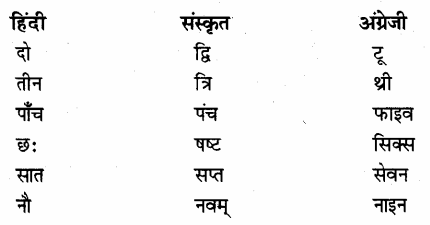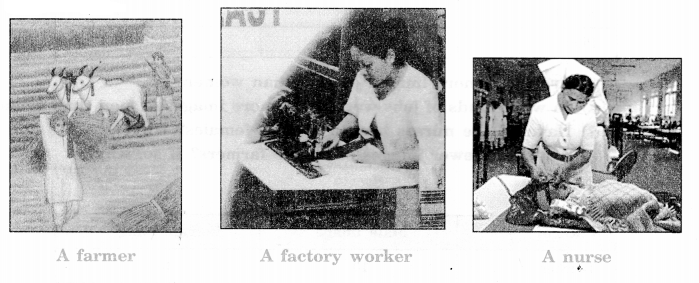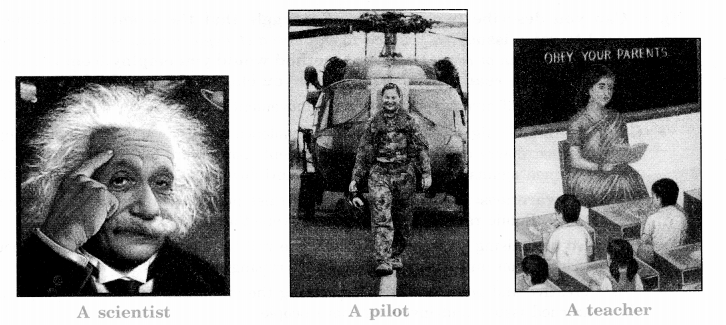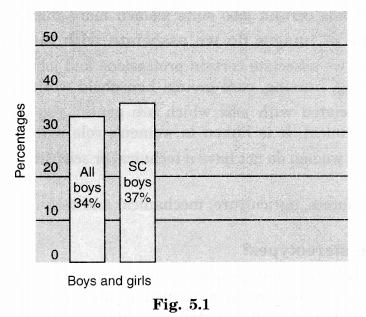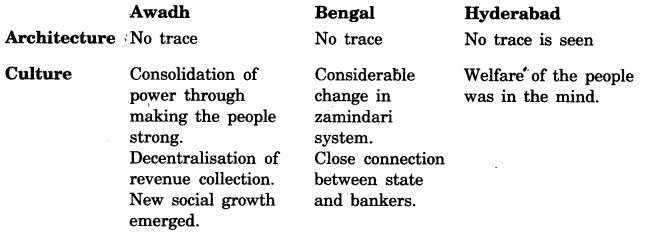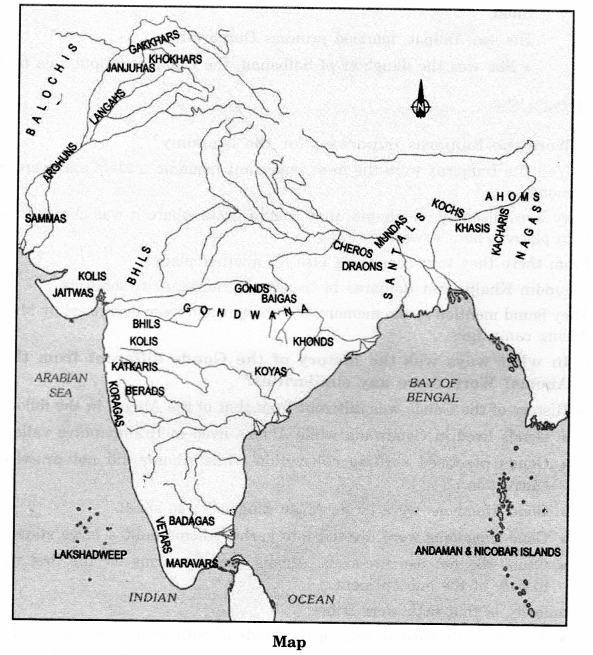NCERT Solutions for Class 7 Hindi Vasant Chapter 6 रक्त और हमारा शरीर (यतीश अग्रवाल) are part of NCERT Solutions for Class 7 Hindi. Here we have given NCERT Solutions for Class 7 Hindi Vasant Chapter 6 रक्त और हमारा शरीर (यतीश अग्रवाल).
| Board | CBSE |
| Textbook | NCERT |
| Class | Class 7 |
| Subject | Hindi Vasant |
| Chapter | Chapter 6 |
| Chapter Name | रक्त और हमारा शरीर (यतीश अग्रवाल) |
| Number of Questions Solved | 16 |
| Category | NCERT Solutions |
NCERT Solutions for Class 7 Hindi Vasant Chapter 6 रक्त और हमारा शरीर (यतीश अग्रवाल)
पाठ्यपुस्तक के प्रश्न-अभ्यास
(पृष्ठ 40-41)
पाठ से
प्रश्न 1.
रक्त के बहाव को रोकने के लिए क्या करना चाहिए? [Imp.]
उत्तर
रक्त के बहाव को रोकने के लिए उस स्थान पर कसकर साफ़ कपड़ा बाँध देना चाहिए, क्योंकि दबाव पड़ने पर रक्त का बहना कम हो जाता है फिर जल्दी ही डॉक्टर के पास ले जाना चाहिए।
प्रश्न 2.
खून को ‘भानुमती का पिटारा” क्यों कहा जाता है?
उत्तर-
खून को ‘भानुमती का पिटारा’ इसलिए कहा जाता है, क्योंकि इसमें लाखों कण तरह-तरह के होते हैं। इसमें यदि सूक्ष्मदर्शी से खून की एक बूंद को जाँचा जाए तो इसमें लाखों की संख्या में लाल रक्त कण मौजूद होते हैं जिसकी हम कल्पना नहीं कर सकते। इसके अलावे इसके दो भाग होते हैं-पहला तरल भाग प्लाज्मा कहलाता है। दूसरे भाग में छोटे-छोटे कई कण होते हैं, जो प्लाज्मा में तैरते रहते हैं। इन कणों में कुछ लाल, कुछ-कुछ सफ़ेद तथा कुछ रंगहीन कण होते हैं। यह रंगहीन कण बिंबाणु कहलाते हैं। रक्त की एक बूंद में इतनी सारी चीज मौजूद होने के कारण ही उसे ‘भानुमती का पिटारा’ कहा जाता है।
प्रश्न 3.
एनीमिया से बचने के लिए हमें क्या-क्या खाना चाहिए?
उत्तर
एनीमिया से बचने के लिए हमें पौष्टिक आहार का सेवन करना चाहिए। हमें अपने भोज्य पदार्थों में उचित मात्रा में हरी सब्ज़ियाँ, फल, दूध, अंडे व गोश्त खाना चाहिए ताकि हमारे शरीर को प्रोटीन, लौहतत्त्व और विटामिन पूरी तरह मिलते रहें। |
प्रश्न 4.
पेट में कीड़े क्यों हो जाते हैं? इनसे कैसे बचा जा सकता है? [Imp.]
उत्तर
पेट में कीड़े दूषित जल और खाद्य पदार्थों द्वारा शरीर में प्रवेश करते हैं। इनसे बचने के लिए सफ़ाई से बने खाद्य पदार्थ ग्रहण करने चाहिए। भोजन करने से पहले हाथ धोने चाहिए और साफ़ जल पीना चाहिए। इसके अलावा हमें कभी नंगे पाँव नहीं घूमना चाहिए क्योंकि जमीन की ऊपरी सतह पर एक प्रकार के कीड़े पाए जाते हैं। ये अंडों से उत्पन्न लार्वे की सहायता से शरीर में प्रवेश कर आँतों तक पहुँच जाते हैं इसलिए नंगे पाँव कभी घूमना नहीं चाहिए।
प्रश्न 5.
रक्त के सफ़ेद कणों को ‘वीर सिपाही’ क्यों कहा गया है? [Imp.]
उत्तर
रक्त के सफ़ेद कणों को ‘वीर सिपाही’ कहा गया है क्योंकि ये रोगों के कीटाणुओं को शरीर में घुसने नहीं देते, उनसे डटकर मुकाबला करते हैं। ये हमारी बहुत-से रोगों से रक्षा करते हैं।
प्रश्न 6.
ब्लड-बैंक में रक्तदान से क्या लाभ है?
उत्तर
ब्लड-बैंक में दान किए गए रक्त को सुरक्षित रूप में रखा जाता है। किसी भी व्यक्ति को रक्त की आवश्यकता पड़े तो उसके लिए किसी भी रक्त-समूह का रक्त वहाँ से लिया जा सकता है। इससे मरीज़ की जान बच सकती है।
प्रश्न 7.
साँस लेने पर शुद्ध वायु से जो ऑक्सीजन प्राप्त होती है, उसे शरीर के हर हिस्से में कौन पहुँचाता है
सफ़ेद कण लाल कण
साँस नली फेफड़े
उत्तर
लाल कण।
पाठ से आगे
प्रश्न 1.
रक्त में हीमोग्लोबिन के लिए किस खनिज की आवश्यकता पड़ती है-
जस्ता शीशा
लोहा प्लैटिनम
उत्तर
लोहा।
प्रश्न 2.
बिंबाणु (प्लेटलैट कण) की कमी किस बीमारी में पाई जाती है-
टाइफ़ायड मलेरिया
डेंगू फ़ाइलेरिया
उत्तर
डेंगू।
भाषा की बात
प्रश्न 1.
(क) चार महीने के होते-होते ये नष्ट हो जाते हैं-
• इस वाक्य को ध्यान से पढिए। इस वाक्य में होते-होते’ के प्रयोग से यह बताया गया है कि चार महीने से पूर्व ही ये नष्ट हो जाते हैं। इस तरह के पाँच वाक्य बनाइए जिनमें इन शब्दों का प्रयोग हो-
बनते-बनते, पहुँचते-पहुँचते, लेते-लेते, करते-करते
उत्तर
बनते-बनते – मैंने नया घर लेने का फैसला किया लेकिन बात बनते-बनते बिगड़ गई। |
पहुँचते-पहुँचते – वह घर पहुँचते-पहुँचते न जाने क्यों रास्ते में रुक गया।
लेते-लेते – मैंने सात्विक से पेंसिल लेते-लेते छोड़ दी।
करते-करते – माँ रात तक घर का काम करते-करते थक गई।
(ख) इन प्रयोगों को पढ़िए-
सड़क के किनारे – किनारे पेड़ लगे हैं।
आज दूर – दूर तक वर्षा होगी।
• इन वाक्यों में होते-होते’ की तरह ‘किनारे-किनारे’ और ‘दूर-दूर’ शब्द दोहराए गए हैं। पर हर वाक्य में अर्थ भिन्न है। किनारे-किनारे का अर्थ है-किनारे से लगा हुआ और दूर-दूर का-बहुत दूर तक।
• आप भी निम्नलिखित शब्दों का प्रयोग करते हुए वाक्य बनाइए और उनके अर्थ लिखिए-
ठीक-ठीक, घड़ी-घड़ी, कहीं-कहीं, घर-घर, क्या-क्या
उत्तर
ठीक-ठीक (सही-सही) – माँ ने बच्चे से कहा-‘गृहकार्य ठीक-ठीक करना।’
घड़ी-घड़ी (हर पल) – विद्यालय की ओर से घूमने गए मोहन को घड़ी-घड़ी माता-पिता की याद आ रही थी।
कहीं-कहीं (किसी किसी स्थान पर) – बगीचे में कहीं-कहीं गुलाब के फूल लगे थे।
घर-घर (प्रत्येक घर में) – घर-घर यह खबर फैलते देर न लगी कि शहर में लुटेरे घूम रहे हैं।
क्या-क्या (कौन सा) – दिव्या ने मोहिनी से पूछा कि तुम्हें बाजार से क्या-क्या लेना है?
प्रश्न 2.
इस पाठ में दिए गए मुहावरों और कहावतों को पढ़िए और वाक्यों में प्रयोग कीजिए
| भानुमती का पिटारा, दस्तक देना, धावा बोलना, घर करना, पीठ ठोकना |
उत्तर-
- भानुमती का पिटारा ( तरह-तरह की वस्तुएँ होना)-मेरी मम्मी का बक्सा तो पूरा भानुमती का पिटारा होता है।
- दस्तक देना (खट-खटाना)-चोर की सूचना पाकर पुलिस ने उसके घर पर दस्तक दी।
- धावा बोलना ( हमला करना)-डाकुओं ने अचानक गाँव पर धावा बोल दिया।
- घर करना (स्थान बना लेना)-रोगाणु धीरे-धीरे मनुष्य के शरीर में घर करने लगते हैं।
- पीठ-ठोकना (शाबाशी देना)-परीक्षा में प्रथम आने पर मेरे पिता जी ने मेरी पीठ ठोकी।
कुछ करने को
प्रश्न 1.
अपने परिवार के अट्ठारह वर्ष से पचास वर्ष तक की आयुवाले सभी स्वस्थ सदस्यों को रक्तदान के लिए प्रेरित कीजिए और समय आने पर स्वयं भी रक्तदान करने का संकल्प लीजिए।
उत्तर
छात्र स्वयं करें।
प्रश्न 2.
शरीर-रचना का चित्र देखकर उसमें रक्त संचार क्रिया को ठीक-ठीक समझिए।
उत्तर-
पुस्तकालय में विज्ञान की पुस्तक में इस प्रश्न का उत्तर पूँढ़िएँ।
प्रश्न 3.
नीचे दिए गए प्रश्नों के बारे में जानकारी एकत्र कीजिए-
(क) ब्लू बेबी क्या है?
(ख) रक्त के जमाव की क्रिया में बिंबाणु (प्लेटलेट) का कार्य क्या है?
(ग) रक्तदान के लिए कम-से-कम कितनी उम्र होनी चाहिए?
(घ) कितने समय बाद दोबारा रक्तदान किया जा सकता है?
(ङ) क्या स्त्री का रक्त पुरुष को चढ़ाया जा सकता है?
उत्तर
- किसी पैदा हुए बच्चे का यदि हृदय कमजोर हो तो उसे सही रूप से ऑक्सीजन नहीं मिल पाती। वह ठीक से साँस नहीं ले सकता। धीरे-धीरे उसका शरीर नीला पड़ना शुरू हो जाता है क्योंकि ऑक्सीजन की कमी से खून सही रूप से पूरे शरीर में दौरा नहीं करता।
- रक्त के जमाव की क्रिया में बिंबाणु (प्लेटलैट) विशेष भूमिका निभाते हैं। जब कोई चोट लग जाए तो रक्त के तरल भाग प्लाज्मा में एक विशेष किस्म की प्रोटीन होती है जो रक्त वाहिका की कटी-फटी दीवार में मकड़ी के जाले के समान एक जाला बुन देती है। बिंबाणु इस जाले से चिपक जाते हैं और इस तरह दीवार में आई दरार भर जाती है, जिससे रक्त बाहर निकलना बंद हो जाता है।
- रक्तदान के लिए कम-से-कम अट्ठारह वर्ष की आयु होनी चाहिए।
- तीन महीने के बाद दुबारा रक्तदान किया जा सकता है।
- हाँ, स्त्री का रक्त पुरुष को चढ़ाया जा सकता है।
प्रश्न 4.
शरीर के किसी अंग में अचानक रक्त-संचार रुक जाने से क्या-क्या परिस्थितियाँ उत्पन्न हो। सकती हैं?
उत्तर
शरीर के किसी अंग में अचानक रक्त-संचार रुक जाए तो मनुष्य का वह अंग सही रूप में काम करना बंद कर देता है। कई बार इतनी विकट स्थिति पैदा हो जाती है कि जिस स्थान में रक्त संचार नहीं होता वहाँ के रुके हुए खून में जहर फैल जाता है और उस अंग को काटने तक की नौबत भी आ जाती है।
We hope the NCERT Solutions for Class 7 Hindi Vasant Chapter 6 रक्त और हमारा शरीर (यतीश अग्रवाल) help you. If you have any query regarding NCERT Solutions for Class 7 Hindi Vasant Chapter 6 रक्त और हमारा शरीर (यतीश अग्रवाल), drop a comment below and we will get back to you at the earliest.
